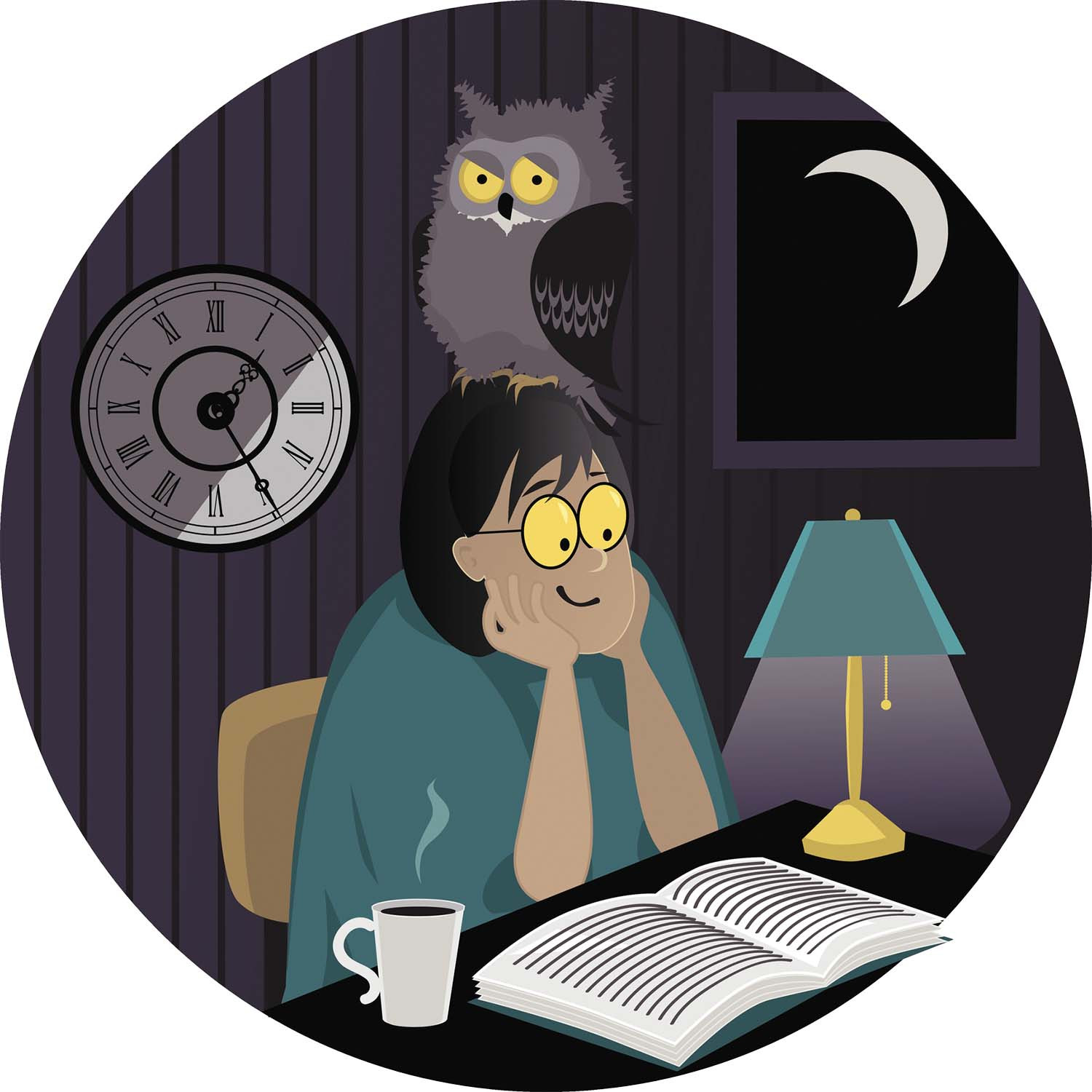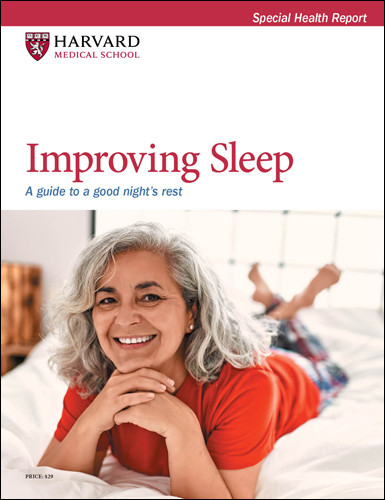Tips to change your night-owl lifestyle
Reclaiming nighttime sleep is better for health, but it takes time and effort to shift your habits.
- Reviewed by Anthony L. Komaroff, MD, Editor in Chief, Harvard Health Letter; Editorial Advisory Board Member, Harvard Health Publishing

Do you naturally stay up until the wee hours and sleep late in the morning? Do you feel more creative, productive, or focused in the afternoon or evening than you do in the morning? If so, you're probably a "night owl." That's the opposite of a "morning lark," someone who wakes with the sun and goes to sleep early.
For a long time, doctors believed there were no health differences between night owls and morning larks as long as you got the optimal seven to nine hours of sleep per night. But that thinking is changing. So it might be time to consider if you should try to shift your sleep pattern.
Night owl risks
A growing amount of evidence suggests that being a night owl may increase the risk of developing many health problems.
For example, a 2023 Harvard-led study of about 64,000 healthy middle-aged women, followed for eight years, found that those who said they were night owls were 72% more likely to develop diabetes than morning larks. The night owls were also more likely than morning larks to be overweight and have an unhealthy life-style — drinking a lot of alcohol, smoking, eating a poor diet, and getting too little sleep. Even after scientists calculated the impact of those lifestyle factors on health, the night owls were still 19% more likely to develop diabetes than morning larks.
In addition, a 2021 study of almost 137,000 middle-aged and older adults suggested that having a bedtime past 10 p.m. was tied to a 20% greater risk of having obesity or a dangerously large waistline (35 or more inches for women, 40 or more for men), compared with people who went to bed between 8 p.m. and 10 p.m. The risk for obesity was even higher (35% to 38%) among people who went to bed between 2 a.m. and 6 a.m. Night owls in this study also slept fewer hours (six or seven hours per night) than morning larks (eight or nine hours per night).
The risks of little sleep
The fact that night owls sometimes sleep less than morning larks only adds to the risk. Sleep is the time when the brain flushes out toxins and consolidates memories and new bits of information. It's when our muscles and cells rebuild.
Getting an inadequate amount of good-quality sleep is linked to poor concentration; increased risks of falls, broken bones, and car crashes; a weakened immune system; and many diseases, such as dementia, diabetes, heart disease, kidney disease, high blood pressure, stroke, obesity, and depression.
The power of darkness
The typical human sleep-wake cycle makes the desire for sleep strongest between midnight and dawn, when it's dark outside.
"We sleep best, with the highest-quality sleep, when the sun is down. That's just how we're wired," says Dr. Kenneth Sassower, a pediatric and adult sleep neurologist at Harvard-affiliated Massachusetts General Hospital. "If you're a night owl and you don't go to sleep until the middle of the night, you're not maximizing the number of hours you can sleep in darkness. The sun comes up soon after your bedtime, which might lead to poor-quality or interrupted sleep."
Tips for successGive yourself the best chance of successfully shifting your sleep-wake cycle by following good sleep hygiene.
|
Changing your sleep schedule
It's not that the evidence is so strong that night owls should definitely go to sleep and awaken earlier. But the evidence is convincing enough that it's worth a try, particularly if you're not sleeping long enough or if the bulk of your sleep isn't occurring when it's dark outside.
Is it possible to shift your sleep-wake cycle, even if you're not wired to go to bed earlier? "Yes, but it's a slow process," Dr. Sassower says. He recommends the following steps.
Set a bedtime goal. Dr. Sassower suggests aiming for a bedtime between 11 p.m. and 1 a.m., so you'll get at least five hours of sleep in darkness.
Gradually go to bed earlier. "You can't just start going to sleep hours earlier and expect to make a lasting change to your sleep-wake cycle. Your brain won't comply," Dr. Sassower says. He advises rolling back your bedtime by 20 minutes every five days, until you reach your desired bedtime.
For example, if you currently go to sleep at 1 a.m. each night and would prefer a bedtime of about 11:30 p.m., go to sleep at
12:40 a.m. for five nights
then 12:20 a.m. for five nights
then midnight for five nights
then 11:40 p.m. for five nights
then 11:20 p.m. indefinitely.
Use medication. Until you reach your bedtime goal, it might help to take melatonin, a hormone that helps regulate the sleep-wake cycle. If you use an over-the-counter supplement, you should take it two hours before bedtime. It would be more effective, Dr. Sassower says, if you take a more potent prescription version of melatonin, a drug called ramelteon (Rozerem), at bedtime. You'll have to talk to your doctor about that.
Set a wake time. "Don't get up late," Dr. Sassower says. "You need a consistent wake time to train the brain. Don't make it any later than 9 a.m."
Be patient. Once you've reached your bedtime goal, it will take about 90 days to officially establish the new sleep schedule and make it stick. "I'm not saying it's easy," Dr. Sassower says, "but it can be done. And you'll probably sleep better, feel the difference, and improve your health."
Image: © Aleutie/Getty Images
About the Author

Heidi Godman, Executive Editor, Harvard Health Letter
About the Reviewer

Anthony L. Komaroff, MD, Editor in Chief, Harvard Health Letter; Editorial Advisory Board Member, Harvard Health Publishing
Disclaimer:
As a service to our readers, Harvard Health Publishing provides access to our library of archived content. Please note the date of last review or update on all articles.
No content on this site, regardless of date, should ever be used as a substitute for direct medical advice from your doctor or other qualified clinician.
















